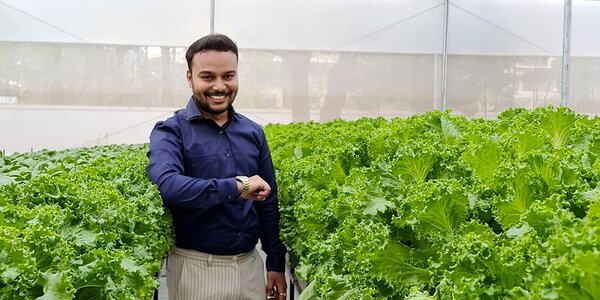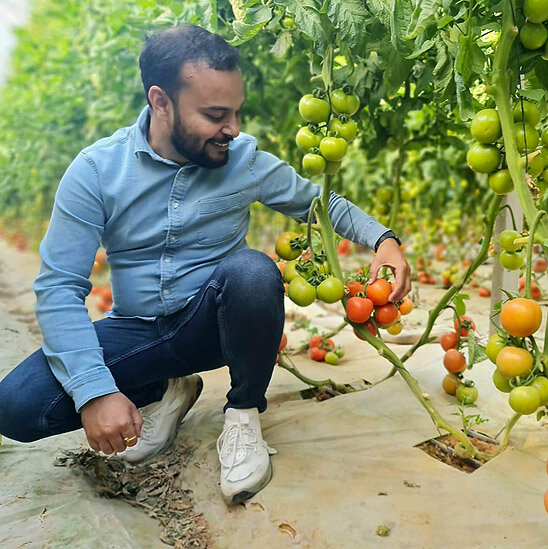Good future for high-performance temporary coatings on plastic greenhouses
Agriplast Tech India Ltd. is a market leader in manufacturing transparent film for greenhouses. Far beyond its borders, the company supports growers to achieve higher yields of better quality. "With our products and agronomic expertise, we support the transition from open to covered cultivation. This results in greater food security for a growing population, more efficient and sustainable cultivation and improved incomes for farmers and gardeners," CEO Ashish Anand summarises. "Lumiforte's coatings also play a role in this."
Ashish Anand is a passionate entrepreneur. Convinced of the usefulness and necessity of agricultural (r)evolution in (sub)tropical regions, he travels extensively to communicate and convey his mission to farmers and growers.
"Globally, we are seeing a trend towards crops being grown in greenhouses," Ashish observes. “This is now also gaining ground in warm areas. Farmers and growers in these areas do not usually need expensive heated glass greenhouses; simple film plastic structures can serve the purpose quite effectively. These polyhouses provide protection from extreme weather events such as monsoon rains, keep pests at bay, and reduce water consumption for cultivation. We therefore see more and more crops, the relatively expensive ones, in particular, moving from outside to inside. Covered cultivation is gaining ground very quickly."

CEO Ashish Anand - Agriplast Tech India Ltd.
Strong growth market
Over the past decade, Agriplast Tech India and its agents have supervised some 350 new construction and renovation projects in 27 countries, all located in the tropics and subtropics. Ashish Anand estimates the current area of plastic greenhouses in his home country to be 100,000 hectares, but expects it to be at least 500,000 hectares in 10 years' time. He thinks it may even expand to a million hectares.
“Put simply, better results are achieved in greenhouses," said the film manufacturer. "This is also seen by farmers and growers in the area who have not yet invested in greenhouses. It is noted by venture capitalists, who see sustainable and efficient food production as an interesting long-term growth market. Their growing interest supports the expansion and scaling up of covered crops.
High-end technology that further increases yields and makes them more predictable, such as climate computers and automated ventilation and irrigation systems, is also being used more frequently. We welcome that, but it also requires a higher level of knowledge from users. For this reason, we see knowledge transfer as an indispensable part of our services."
That knowledge is shared and transferred in various ways, including through seminars and presentations at numerous locations in Asia and Africa, participation in agricultural trade fairs and group excursions to customer projects.

Heat-resistant coatings
Polyhouses effectively protect crops from rain and cold but could use some help during the hottest time of the year to protect crops from excessive heat. Traditionally, a thin layer of chalk is applied to the glass or film for this purpose, which reflects heat radiation. This keeps the greenhouse cooler so the crop experiences less heat stress, which keeps it growing better.
"Sombrasol is by far the most widely used product within this segment," Ashish says when asked. "This simple coating does what it promises and automatically washes off the greenhouse when the rainy season arrives. However, a limitation of these types of coatings is that they also block out a lot of light. Lumiforte, however, has also developed other temporary coatings, which have significantly reduced this limitation. This allows you to respond even better to conditions and more effectively exploit the plant's growth potential. Based on their higher added value, I expect these newer, high-performance coatings to gain a great deal of ground in the coming years."
ReduHeat, ReduFuse IR and ReduClean
To better understand the performance of high-quality temporary coatings at different doses, Agriplast is conducting its own trials. "Sombrasol has been thoroughly tested by us and our customers, but we have little experience with ReduHeat and Redufuse IR in the tropics," Ashish explains. "We are excited about ReduHeat and even more so about ReduFuse IR. ReduHeat reflects heat radiation, but allows the growing light to simply penetrate into the greenhouse. If you want to block even more heat radiation and diffuse the growing light at the same time, ReduFuse IR is the perfect choice. Diffuse light penetrates deeper into the crop, increasing photosynthesis levels compared to the same amount of direct incident light. Moreover, scattered light results in even less heat stress. You can see that many crops benefit from that, both visually and in terms of production figures."
Another difference from Sombrasol is that the high-quality, new coatings weather slowly and require a specific cleaning agent (ReduClean) to remove them properly and responsibly from glass or film. "It is not complicated because after you spray ReduClean in the right dosage over the greenhouse, the coating loses its adhesion and rain does the rest," says the film manufacturer.
Easy to calculate in advance
Ashish accepts that the combined price tag of a high-quality coating and ReduClean will be a lot higher than the simple coatings most growers currently use. It does not worry him at all.
"You shouldn't be swayed merely by the expense, but more importantly focus on the potential returns," he reasons. “Film greenhouses also cost money and yet massive investments are made in them. That makes good sense, as they result in higher yields than with outdoor cultivation. Similarly, you need to look at temporary coatings: what are the expected incremental benefits, what does the treatment cost and how much money are you left with in the end? That's what counts."
Based on its own research results and the customer's local climate conditions, Agriplast and its advisers can properly assess which coating is most beneficial for that customer. “It can all be carefully calculated," Ashish explains. "On this basis, we have great expectations for high-performance coatings for greenhouses with 'value crops' such as herbs, fruiting vegetables and ornamentals."